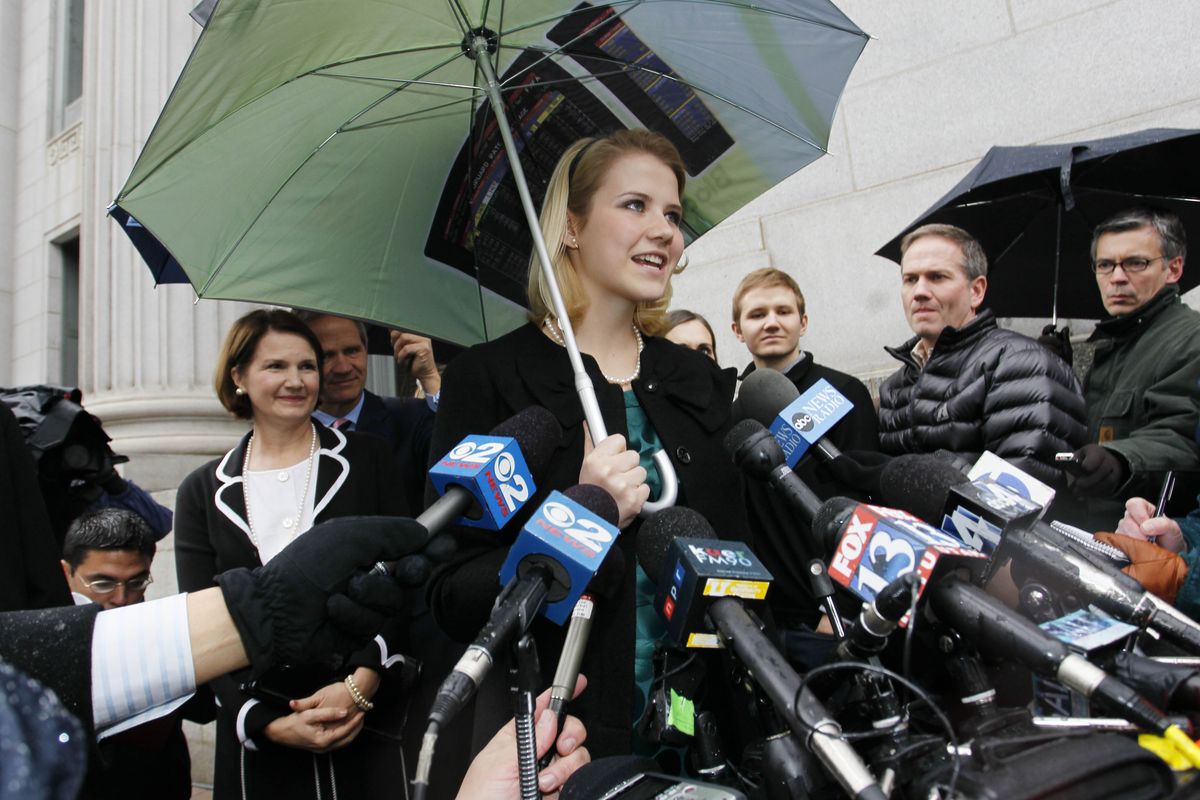Smart’s abductor found guilty
Federal jury convicts Mitchell in kidnap, rape

Eight years ago she was a symbol of stolen innocence, snatched from her bedroom at age 14, chained up and raped for nine months before being rescued.
On Friday, Elizabeth Smart, now 23, symbolized something else in a federal courtroom in Salt Lake City: resilience. She watched a jury convict her kidnapper, the culmination of a long legal battle that featured Smart’s calm, methodical testimony about the unspeakable things Brian David Mitchell did to her during her captivity.
“The beginning and end of this story is … a woman with extraordinary courage and extraordinary determination,” Acting U.S. Attorney Carlie Christensen told reporters after the verdict was read. Smart recounted her travails, Christensen said, “with a candor and clarity and a truthfulness that I think moved all of us. She is a remarkable young woman.”
Later, Smart spoke to reporters outside the courthouse. “I hope that not only is this an example that justice can be served in America, but that it is possible to move on after something terrible has happened,” Smart said.
The abduction of Smart – petite, blond and a member of a devout Mormon family – attracted worldwide attention and an outpouring of prayers for her safe return. The circumstance of her disappearance – taken as her parents slept – added to the horror, and her rescue prompted an even larger outpouring of relief and joy.
After five hours of deliberations, the jury found Mitchell, 57, guilty of transporting a minor across state lines for sexual exploitation and interstate kidnapping. He could face life in prison and is scheduled to be sentenced May 25.
Mitchell’s attorneys never denied the allegations against him but contended that Mitchell – who said that God ordered him to abduct Smart and rape her – was clinically insane and should not be convicted for his acts.
Prosecutors said Mitchell, who had used an insanity defense to avoid a conviction in state court, was only play-acting.
Outside court, his stepdaughter, Rebecca Woodridge, who herself had been sexually assaulted by Mitchell decades ago, told reporters she thought his mental illness meant he could not be held legally responsible for his actions.
Smart was abducted June 5, 2002. She testified she woke with Mitchell standing over her, a knife to her throat. He threatened to kill her family if she did not go with him.
Mitchell took Smart as a “plural wife” and began raping her, telling her it was God’s will and preaching a twisted version of Mormon theology. He locked a cable around Smart’s leg and chained it to a tree. She spent months living in primitive conditions and was raped multiple times a day.
In March 2003, a biker spotted Mitchell walking with a girl in a Salt Lake City suburb. Smart was dressed in a wig and sunglasses. She testified that she was so scared of Mitchell she initially didn’t identify herself to police when they picked her up.
Mitchell was found mentally incompetent to stand trial by state courts and held at a psychiatric hospital. Federal authorities took over the case and were able to get Mitchell declared competent at a federal court hearing last year.
Smart calmly sat through much of the trial, though she and her mother stormed out of court when one state psychiatrist testified that she had picked out baby names during her captivity in case she became pregnant.
Smart, who is on a break from her LDS mission in France, said she hoped other victims of sex crimes and abductions would take heart from the verdict. “We can speak out,” she said, “and we will be heard.”
Until Mitchell’s trial, Smart had remained largely out of the public eye and embarked on her mission work in Europe. But last year she appeared on CNN to offer advice to Jaycee Lee Dugard, who was discovered 18 years after being kidnapped from South Lake Tahoe.
“I would just encourage her to find different passions in life and continually push forward and learn more and reach more for them,” Smart said, “and not to look behind, because there’s a lot out there.”